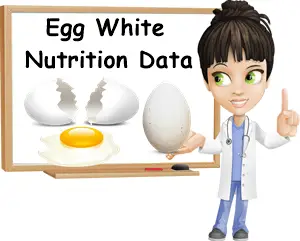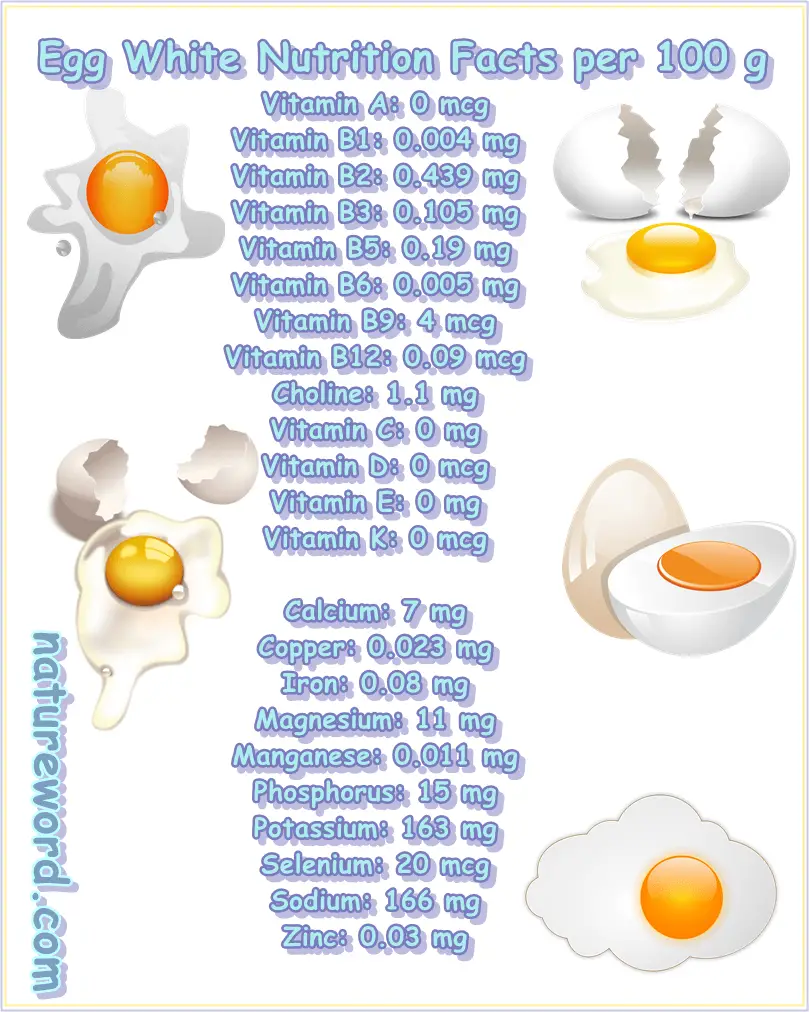Egg white is the part of the egg that everyone knows is healthy and good for you, better than the egg yolk. But just how much healthier is the egg white vs the egg yolk? Nutrition data shows egg whites are high protein, but low in calories, and very low in fat and carbs, with no cholesterol. Other than this, there are few notable nutrition facts to report on egg whites.
Egg whites don’t have the best nutritional value, except for the high protein content, and good content of vitamin B2 and selenium.
Even so, there are quite a few benefits to eating egg whites such as benefits for losing weight, building muscle and counteracting muscle soreness by repairing damaged muscle fibers. Egg whites are also good for bloating, high blood sugar and bone health, hair fall and help make antibodies for the immune system.

Egg White: Nutrition Facts per 100 g of Raw Egg White
Nutritional values determined for 100 grams of raw egg white from chicken eggs which is the equivalent of roughly 3 egg whites. Nutritional data for other varieties of egg may differ.
Macronutrients
- Energetic value (calories): 52 to 55 kcal (kilocalories)
- Carbohydrates content: 0.73 g (grams) (the average adult can eat up to 278 g of carbs per day)
- Fiber content: 0 g
- Sugar: 0.71 g
- Protein content: 10.9 g (the average adult needs 50 g of protein per day)
- Fat content: 0.17 g (the average adult can eat up to 78 g of fat per day)
- Cholesterol: 0 mg
- Water content: 87.57 g and up to 89 g of water
Vitamins in egg white:
- Vitamin A: 0 mcg (micrograms)
- Vitamin B1: 0.004 mg (milligrams) (0.33% of daily vitamin B1 requirements)
- Vitamin B2: 0.439 mg (40% of daily vitamin B2 for women, and over 33% for men)
- Vitamin B3: 0.105 mg (under 1%)
- Vitamin B5: 0.19 mg (3.8% of daily values)
- Vitamin B6: 0.005 mg (under 0.5%)
- Vitamin B9: 4 mcg (only 1% of daily values)
- Vitamin B12: 0.09 mcg (3.75% of daily values)
- Choline: 1.1 mg (0.2% of daily values)
- Vitamin C: 0 mg
- Vitamin D: 0 mcg
- Vitamin E: 0 mg
- Vitamin K: 0 mcg
Observation: Egg whites naturally have no vitamin A, no vitamin C, no vitamin D, no vitamin E and no vitamin K.
Minerals in egg white:
- Calcium: 7 mg (0.5% of daily calcium requirements)
- Copper: 0.023 mg (2.5% of daily values)
- Iron: 0.08 mg (only 0.4% of daily values)
- Magnesium: 11 mg (2.75% of daily values)
- Manganese: 0.011 mg (0.6% of daily manganese for women and 0.47% for men)
- Phosphorus: 15 mg (2.1% of daily values)
- Potassium: 163 mg (3.46% of daily values)
- Selenium: 20 mcg (over 36% of daily values)
- Sodium: 166 mg (11% of daily values)
- Zinc: 0.03 mg (0.27% of daily values)
Observation: Egg whites are only slightly higher in sodium and potassium compared to egg yolks per 100 g, and have a high selenium content, but lower than that of egg yolk.
Note: nutritional data for raw (fresh) egg whites from USDA gov.

Egg White: Nutrition Facts per 100 g of Cooked Egg White
Nutritional values determined for 100 grams of cooked egg white from chicken eggs (omelet, scrambled egg whites, fried egg whites, no added fat). Nutritional data for other varieties of eggs may differ.
Macronutrients
- Energetic value (calories): 52 kcal (kilocalories)
- Carbohydrates content: 0.73 g (grams)
- Fiber content: 0 g
- Sugar: 0.71 g
- Protein content: 10.87 g
- Fat content: 0.17 g
- Cholesterol: 1082 mg
- Water content: 87.31 g
Vitamins in cooked egg white:
- Vitamin A: 0 mcg (micrograms)
- Vitamin B1: 0.003 mg (milligrams)
- Vitamin B2: 0.416 mg
- Vitamin B3: 0.094 mg
- Vitamin B5: 0.18 mg
- Vitamin B6: 0.005 mg
- Vitamin B9: 3 mcg
- Vitamin B12: 0.07 mcg
- Choline: 0.9 mg
- Vitamin C: 0 mg
- Vitamin D: 0 mcg
- Vitamin E: 0 mg
- Vitamin K: 0 mcg
Minerals in cooked egg white:
- Calcium: 7 mg
- Copper: 0.023 mg
- Iron: 0.08 mg
- Magnesium: 11 mg
- Manganese: 0.011 mg
- Phosphorus: 15 mg
- Potassium: 163 mg
- Selenium: 19.9 mcg
- Sodium: 281 mg
- Zinc: 0.03 mg
Note: nutritional data for cooked egg white (scrambled, omelet, fried, no fat) from USDA.gov.
Observation: There isn’t much of a difference in terms of nutrition between raw egg whites and cooked egg whites, when cooking does not employ the use of additional ingredients such as fat or sugar, various vegetables etc. Fresh and cooked egg white have about the same nutritional value, with only minor differences.
